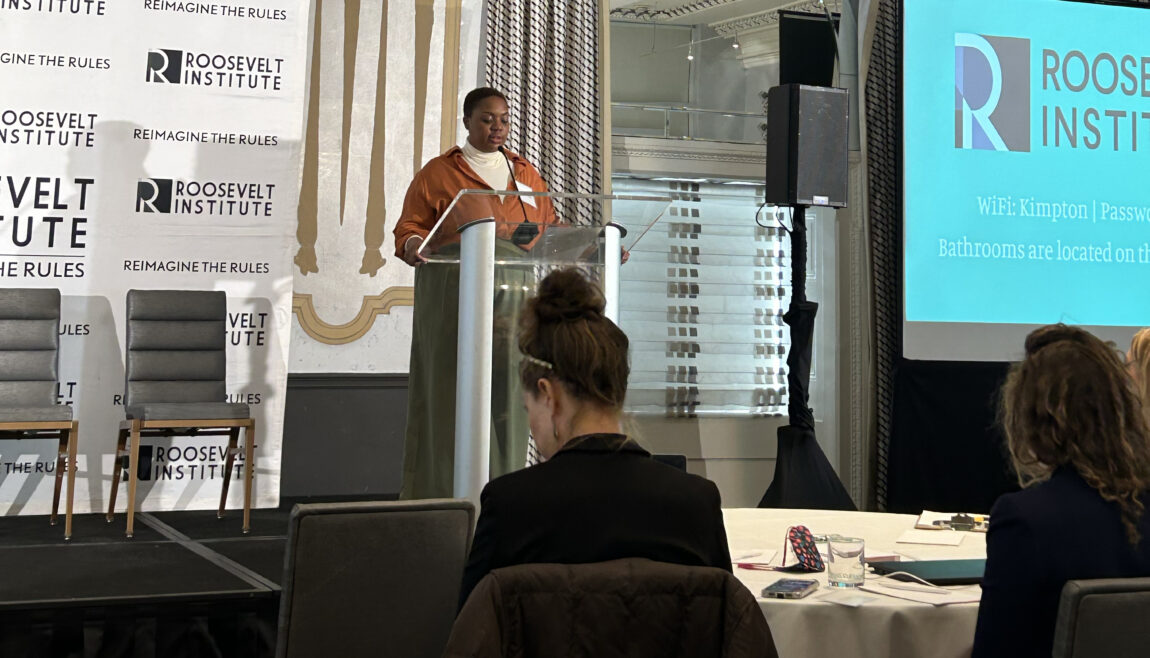A Justice-Centered Vision for Permitting Reform
March 22, 2023
By Rhiana Gunn-Wright

On Tuesday, March 21, 2023, the Roosevelt Institute hosted Building the Green Transition: A Justice-Centered Vision for Permitting Reform—a one-day, in-person conversation in Washington, DC, featuring experts in government, academia, industry, and environmental policy.
Below is an excerpt from Roosevelt Director of Climate Policy Rhiana Gunn-Wright’s opening remarks.
As many of you no doubt know, efficiently greenlighting the development of renewable energy projects is crucial to the success of a transition to clean and renewable energy. As a result, permitting reform has emerged as a central focus of IRA [Inflation Reduction Act] implementation and a rare opportunity for bipartisan cooperation.
But, to date, the conversation about permitting reform has been dominated by proposals that would weaken the National Environmental Permitting Act—one of the nation’s foundational environmental protection laws—largely by limiting public participation and environmental review through measures like time limits, page limits, and reducing the amount of time citizens have to file suit.
As many panelists will share, it is unclear how much these proposals will help support the timely development of renewable energy projects, but the effect is likely to be limited. But what is certain is that these reforms, if undertaken indiscriminately, will not only make frontline communities more vulnerable to exploitation by fossil fuel industries —who stand to gain the most from these changes—but are more likely than not to replicate what Nathanael Greene, one of our speakers today, describes as the “destructive and racist permitting solutions exploited by the incumbent [energy] system.”
Just as importantly, they would make it more difficult for there to be a credible means of democratic control and participation during what will be an unprecedented build-out of clean energy infrastructure. At a time when trust in government is so low and mistrust of clean and renewable energy projects is increasingly high, especially in communities where these projects are likely to be built, curtailing democracy actually risks a backlash that could ultimately slow the transition.
Luckily, as today’s panels will share, there are many ways to advance climate justice and maintain public participation while supporting and streamlining the permitting of renewable energy projects and the transmission these projects will require. The ideas that you will hear today are some of the reforms best suited to address some of the larger issues that threaten to stymie the build-out of renewable energy. Because the question of how to build out renewable energy more quickly is not only a technical problem; it’s a problem of political economy.
The US still has an economy and an energy system designed for—and reliant on—the use of fossil fuels. There are still a slew of powerful actors who profit greatly from the status quo and stand ready and willing to protect it—from fossil fuel companies to recalcitrant utilities to some state and local agencies in regions reliant on fossil fuels.
Permitting reform, if done right, offers an opportunity to not just confront these actors but to redesign our system to limit their influence, rather than the influence of communities and their advocates. Because while the latter may promise some short-term wins, it is only the former that can create the trust and structural changes we need to successfully build the green transition for the long haul.
Rhiana Gunn-Wright full opening remarks.
Roosevelt Institute's Climate and Economic Transformation Program
Learn More Opens in new window